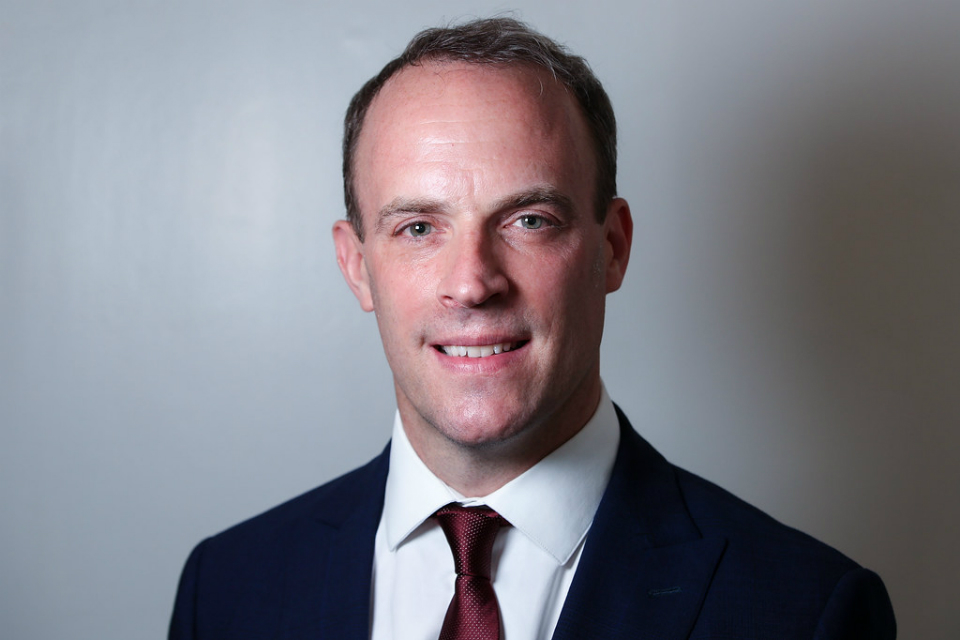Treatment of Uyghur Muslims in Xinjiang: Foreign Secretary's statement, 22 March 2021
Foreign Secretary Dominic Raab gave a statement to the House of Commons on the human rights situation in Xinjiang, China.

Mr Speaker, with permission I would like to make a statement about the treatment of the Uyghur Muslims in Xinjiang.
This is one of the worst human rights crises of our time and I believe the evidence is clear, as it is sobering. It includes satellite imagery; survivor testimony; official documentation and indeed leaks from the Chinese government itself; credible open source reporting, including from Human Rights Watch and Amnesty International; visits by British diplomats to the region that have corroborated other reports about the targeting of specific ethnic groups.
In sum, the evidence points to a highly disturbing program of repression. Expressions of religion have been criminalised; Uyghur language and culture discriminated against on a systematic scale; there is widespread use of forced labour; women forcibly sterilised; children separated from their parents; an entire population subject to surveillance, including collection of DNA, use of facial recognition software, and so-called ‘predictive policing’ algorithms.
State control in the region is systemic: over a million people have been detained without trial; there are widespread claims of torture and rape in the camps, based on first-hand survivor testimony. People are detained for having too many children; for praying too much; for having a beard or wearing a head scarf; for having the wrong thoughts.
I’m sure the whole House will join with me in condemning such appalling violations of the most basic human rights. In terms of scale, it is the largest mass detention of an ethnic or religious group since the Second World War, and I believe one thing is clear – the international community cannot simply look the other way.
Mr Speaker, it has been 2 and a half years since the UN Committee for the Elimination of Racial Discrimination called on China to stop arbitrarily detaining Uyghurs and other minorities in the Xinjiang province.
And it’s over 18 months since the UK led the first-ever joint UN statement on Xinjiang, at the General Assembly’s Third Committee back in October 2019.
The number of countries now willing to speak out collectively has grown from just 23 to 39, as the evidence has accumulated and as our diplomatic efforts have borne fruit. And this is a clear signal to China about the breadth of international concern.
Last year, 50 independent UN experts spoke out about the situation in an exceptional joint statement calling on China to respect basic human rights.
Last month, at the Human Rights Council, I led the calls on China to give the United Nations High Commissioner for Human Rights, Michelle Bachelet, or some other fact-finding expert, urgent, unfettered access to Xinjiang. Since then, Ms Bachelet herself has reinforced in the clearest terms the need for independent access to verify the deteriorating situation.
Mr Speaker, we regret that, instead of recognising those calls from the international community, China has simply sought to deny them. The Chinese authorities have claimed that the legitimate concerns raised are ‘fake news’.
At the same time, the authorities continue to expand prison facilities, surveillance networks, and forced labour programmes.
And China continues to resist access to the UN or other independent experts, to verify the truth, notwithstanding their blanket denials.
For the UK’s part, our approach has been to call out these egregious, industrial scale human rights abuses, work with our international partners, and ultimately match words with actions.
So, in January, I announced a package of measures to help ensure that no British organisations, government or private sector, deliberately or inadvertently, can profit from human rights violations against the Uyghurs or other minorities, and that no businesses connected with the internment camps can do business in the UK.
Today we are taking further steps, again in coordination with our international partners. Having very carefully considered the evidence against the criteria in our global human rights sanctions regime, I can tell the House today that I am designating 4 senior individuals responsible for the violations that have taken place – and persist – against the Uyghur Muslims in Xinjiang.
Alongside these individuals, we are also designating the Public Security Bureau of the Xinjiang Production and Construction Corps. That’s the organization responsible for enforcing the repressive security policies across many areas of Xinjiang.
The sanctions involve travel bans and asset freezes against individuals, an asset freeze against the entity we’re designating. The individuals are barred from entering the UK. Any assets found in the UK will be frozen.
We take this action alongside the EU, the US and Canada, who are all taking similar measures today. And I think it’s clear that by acting with our partners, 30 of us in total, we’re sending the clearest message to the Chinese Government that the international community will not turn a blind eye to such serious and systematic violations of basic human rights and that we will act, in concert, to hold those responsible to account.
As the Prime Minister set out in the Integrated Review last week, China is an important partner in tackling global challenges like climate change. We pursue a constructive dialogue where that proves possible.
But we will always stand up for our values, and in the face of evidence of such serious human rights violations, we will not look the other way. The suffering of the Uyghur Muslims in Xinjiang cannot be ignored. Human rights violations on this scale cannot be ignored.
Together with our partners, we call on China to end these cruel practices, and I commend this statement to the House.